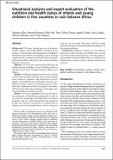Sociodemographic Variations in Communication on Sexuality and HIV/AIDS with Parents, Family members and Teachers among In-school Adolescents: a Multi-site Study in Tanzania and South Africa
View/
Publication Date
2013-06Type
Article, Journalviews
downloads
Metadata
Show full item recordCitation
Namisi FS, Flisher AJ, Overland S, Bastien S, Onya H, Kaaya S, Aarø LE. Sociodemographic variations in communication on sexuality and HIV/AIDS with parents, family members and teachers among in-school adolescents: a multi-site study in Tanzania and South Africa. Scand J Public Health. 2009 Jun;37 Suppl 2:65-74. doi: 10.1177/1403494808086986. PMID: 19493983.
Abstract/
Aims: To identify with whom in-school adolescents preferred to communicate about sexuality, and to study adolescents' communication on HIV/AIDS, abstinence and condoms with parents/guardians, other adult family members, and teachers. Methods: Data were obtained from a baseline questionnaire survey carried out in South Africa (Cape Town and Mankweng) and Tanzania (Dar es Salaam) in early 2004. We analysed data for 14,944 adolescents from 80 randomly selected schools. The mean ages were as follows: Cape Town, 13.38 years (standard deviation (SD) 1.15); Mankweng, 13.94 years (SD 1.35); and Dar es Salaam, 12.94 years (SD 1.31). Results: Adolescent females preferred to receive sexuality information from their mothers, while among males there was a higher preference for fathers in two sites. Thirty-seven per cent, 41% and 29% reported never or hardly ever communicating about sexuality with parents, other adult family members, and teachers, respectively. "Silence'' was more prevalent in Dar es Salaam than in the other two sites. The odds of "never or hardly ever'' communicating with parents in Dar es Salaam were higher among girls than among boys (p < 0.01). For the two South African sites, boys had significantly higher odds of experiencing silence than did girls (both p < 0.001), and socioeconomic status was positively associated with parent-adolescent sexuality communication. In the logistic regression models, explained variation (Nagelkerke's R(2)) across sites ranged from 0.013 to 0.032. Conclusions: In all three sites, a substantial proportion of adolescents reported not communicating with their parents about HIV/AIDS, abstinence, or condoms. The low proportion of explained variation in sexuality communication implies that silence is common across sociodemographic subgroups.
Subject/
Breastfeeding; Children; Health status; Infants; Nutrition; Pregnancy; Sub-Saharan Africa
Publisher
National Library of MedicineCollections
- General - GEN [367]

